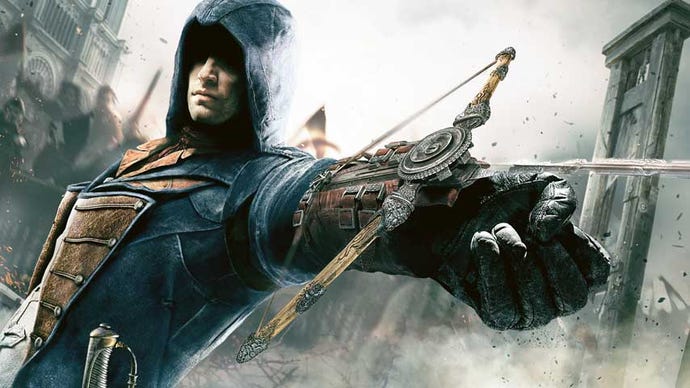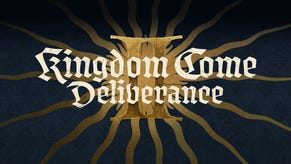Assassin's Creed: Unity, Dragon Age: Inquisition and review embargo nightmares
Assassin's Creed: Unity was available in shops a good half a day before any professional critics were permitted to talk about it, and Ubisoft has done itself absolutely no favours.
Assassin's Creed: Unity was supplied ahead of release to a handful of specialist press outlets (most major magazines, and some websites; VG247 was not among them, despite our best efforts) along with a strict review embargo. This is not unusual and when the code comes with plenty of time to check it out and a comfortably early embargo, it's beneficial to both consumers and press: consumers get plenty of notice if a game is absolute pants, and press can reap plenty of circulation from timely, informative coverage.
What's missing from this picture is the benefits publishers also reap from the arrangement, and that is having specialist press set the conversational tone about a game. It's easiest to illustrate what I mean by that if we look at what happens when the whole system goes to s**t, as it did with Assassin's Creed: Unity.
Assassin's Creed: Unity's review embargo was set half a day after the game was available to purchase in the US, and as a result, the conversational tone has been set by angry early consumers. Even well before copies were supposed to be in consumers' hands, amateur reviews and reports were all over the web bagging out Unity's performance issues and glitches, let alone dissecting its mechanics and narrative.
By the time the reviews eventually hit, the story was already decided - Assassin's Creed: Unity was a buggy piece of s**t. There is nothing a critic can say at that point that could turn that around. A series of perfect scores would have been derided as corruption (Christ on a crutch, I can't make rent this month) and the more realistic (and as it turned out eventual) result of a mixed range of not-so-high scores is just taken as "proof" of the assessment that has already been made.
I promise you, if the chronology was reversed the bugginess of Assassin's Creed: Unity would be much less of a conversation piece; we might even be fielding comments from angry fanboys for daring to criticise it in reporting ongoing issues. The reason for that is that when a professional games reviewer working in isolation plays an enormous open world game and encounters bugs, they write something like "I ran into several glitches, but the publisher says a patch is coming" and move on. The game gets a seven or an eight or whatever, fans love it, and a few people report issues.
If even a single consumer gets their hands on a game and has a poor experience, they go out and leave a one star review filled with invective and anger. This is because it's human nature, except in situations where you're being paid to form an opinion, to only ever speak out when things upset you. When nobody knows anything else about the product yet, the problems become all that is discussed, as others chime in with correlating reports and the few dissenters are drowned out.
So: by letting consumers have first say about a product, Ubisoft is opening itself to consequences like having your shareholders drop you like a hot rock. It's stupid. It's bad business.
Of course, if a game is a buggy piece of s**t then the publisher absolutely deserves the backlash. There's been a string of releases lately where publishers have really let consumers down, and there's been so much to suggest that Assassin's Creed games are being rushed to meet an annual deadline that uncomfortable conversations about Unity - and especially the dire PC version - need to be had. Specialist press absolutely should keep reporting on it until it is fixed - just look at how long we harped on about Driveclub, and if Microsoft doesn't get its s**t together we expect to do the same for Halo: The Master Chief Collection.
But the fact is we currently exist in a world where "Assassin's Creed: Unity is a buggy piece of s**t" is the dominant conversation about a game that has quite a lot going for it, which is being completely ignored; complaints about Unity float to the top of every social sharing site, while positive coverage is buried.
We currently exist in a world where “Assassin’s Creed: Unity is a buggy piece of s**t” is the dominant conversation about a game that has quite a lot going for it, which is being completely ignored.
Does the existence of positive experiences in any way mitigate the experiences of those consumers - especially PC players - who are faced with what seems to be a total mess? Absolutely not. However many of you there are, if you forked out your $60 or whatever for a video game, it should bloody well work as advertised, and we need to draw attention to the issue. But Assassin's Creed: Unity does deserve some positive attention amidst all the perfectly justified calls for Ubisoft to fix the wretched thing and never release a game in a broken state ever again. I personally am yet to encounter any of the spectacular glitches other players have encountered (friends, let me remind you to reset your console every few hours as those caches do fill up and send everything haywire) and although I've barely begun to scratch the surface, I know I'm not alone in that experience. I'm having quite a good time, actually, and I've found lots of nice things to think about it despite my increasing franchise fatigue (there's no boat in this one, which is a great shame).
I'm circling back to my point now. Assassin's Creed: Unity actually did get some positive attention, but it's been absolutely drowned out by the dominant conversational paradigm of "Assassin's Creed: Unity is a buggy piece of s**t". If you look at Unity's review scores, posted half a day after it launched, and then at Dragon Age: Inquisition's, posted a week before launch, there's actually not much difference between them. The majority of Unity's scores are in the seven to eight range, while most of Inquisition's fall into the eight to nine category. Putting aside an enormous debate about the value of review scores and how the one to ten scale is misused, it's pretty clear that the Metacritic score for the two games isn't going to be substantially different - although one dev team is likely to get a fat bonus and the other isn't.
Let's be real: both games are huge open world affairs and both will be riddled with bugs and performance issues - that's just the way these enormous projects are, unfortunately. I have no doubt that Assassin's Creed: Unity will be the worse of the two in that regard, and their varying review scores already reflect that. The real difference is that, when consumers get their hands on Inquisition, it won't matter anywhere near as much if it manifests a bunch of stupid and annoying glitches, because we already live in a world where "Dragon Age: Inquisition is the t*ts" is the dominant conversational paradigm. "I have encountered a bug," many will think to themselves, "But I know this game is the t*ts, and there is lots of good s**t to uncover. I will quietly endure." Meanwhile, the first time you see an error in Unity, you think "Holy hell, this game really is a buggy piece of s**t," and take it straight back to the store.
That difference in reception partly boils down to who set the tone of the conversation - critics or consumers. Hell, I'll go so far to say that Unity's reviews might have been a few points higher all round if the publisher hadn't been a bit of a dick about it; we're only human, and seeing loads of reports about how shitty something is makes it hard to stick to your own uncoloured observations - especially when you know that, for once, the fanboys aren't going to shank you in the comments for daring to criticise. (I'm sure we're all too professional to be affected by irritation at Ubisoft, too, but being forced to rush a review and wait for embargo when traffic's going elsewhere doesn't feel nice. There is a tendency among games press to believe that late code and few pre-release hands-on sessions immediately equates to a shitty game, too. You can see why I hate reviewing, right? It's a minefield.)
As I said, I have no doubt, looking at reviews, that Inquisition is a better game than Unity in terms of performance issues. EA, for all its real and perceived faults, does give BioWare a lot of wriggle room to sort its s**t out, while Ubisoft seems almost panicked in its desire to ensure we have Assassin's Creed shoved down our throat exactly every 12 months. BioWare works towards a pure vision led by a small number of key creatives, whereas Assassin's Creed changes hands constantly, is developed by over half a dozen teams spread across the globe, and suffers so much feature glut that if it isn't a design-by-committee affair at this stage then Ubisoft is doing the world's best impression of it (and should stop). Still, I think it's worth remembering that how we think and feel about games isn't always informed by reality as much as it is by hype and Internet flame wars.
In all this, I find it in me to be sorry for Ubisoft, which after all made some of my favourite games of all time. I can't imagine it's happy about all this. Maybe the game went gold so late that it really couldn't give code out earlier. Maybe that last patch was so important that it gambled on reviewers revising their opinions and scores upwards on that last half day of release.
Ubisoft not only lost control of the conversational space about Unity, it’s now suffering the backlash of being perceived as trying to manipulate gamers into buying a game before the review hits. Forbes went so far as to call Ubisoft “the new EA”, which is hilarious given how generous EA has been with early Inquisition review code.
You'll notice I said gambled there, and I mean gambled and lost. Ubisoft not only lost control of the conversational space about Unity, it's now suffering the backlash of being perceived as trying to manipulate gamers into buying a game before the review hits (Forbes went so far as to call Ubisoft "the new EA", which is hilarious given how generous EA has been with early Inquisition review code).
That's kind of nonsense, actually. If you're the sort of person who lets reviews sway your purchase decision, then 01) you're actually a pretty rare beast and a small proportion of the game's potential sales; and 02) the fact that the review embargo is late only makes you that much more likely to hold off and wait. The bulk of first-week sales happen as pre-orders or launch day sales by people caught up in the hype; the marketing; their faith in the developer; or some combination of all three.
It's the game's sales tail, purchases that occur days, weeks, months and even years after reviews come out, that may suffer for poor reviews, and even those aren't necessarily affected by what Reviewer X wrote so much as the dying off of those early, angry voices. If you watch Metacritic over the course of a game's lifespan you'll notice an interesting phenomenon. First, the critical reviews hit. Then, the user reviews hit, and they're usually significantly lower than the critical consensus, as those few users who experience issues come on board filled with rage and pan the game in a knee-jerk reaction. The really interesting bit happens later, even for games that aren't patched or supported post-launch: user reviews filter in and gradually build and build and build, until eventually you end up with a much higher user rating than critical consensus, and critics are labelled haters for maligning a treasured classic. Would you like a case study? Try bagging out Final Fantasy 13. Wowee! Has audience consensus on that shifted in the last few years.
In general I look on this phenomenon as just another interesting observation about human nature and especially the foibles of the Internet, but when a publisher fails to account for it so spectacularly as to pretty much doom its own product to months of derision it stops being funny and becomes uncomfortably tragic. Sadly, while I don't expect Ubisoft to make the same review embargo mistake twice, I don't think we've seen the end of buggy piece of s**t games this generation.
Brenna will share her full assessment of Assassin's Creed: Unity when she's had a decent amount of time to see some of the funnier glitches.











